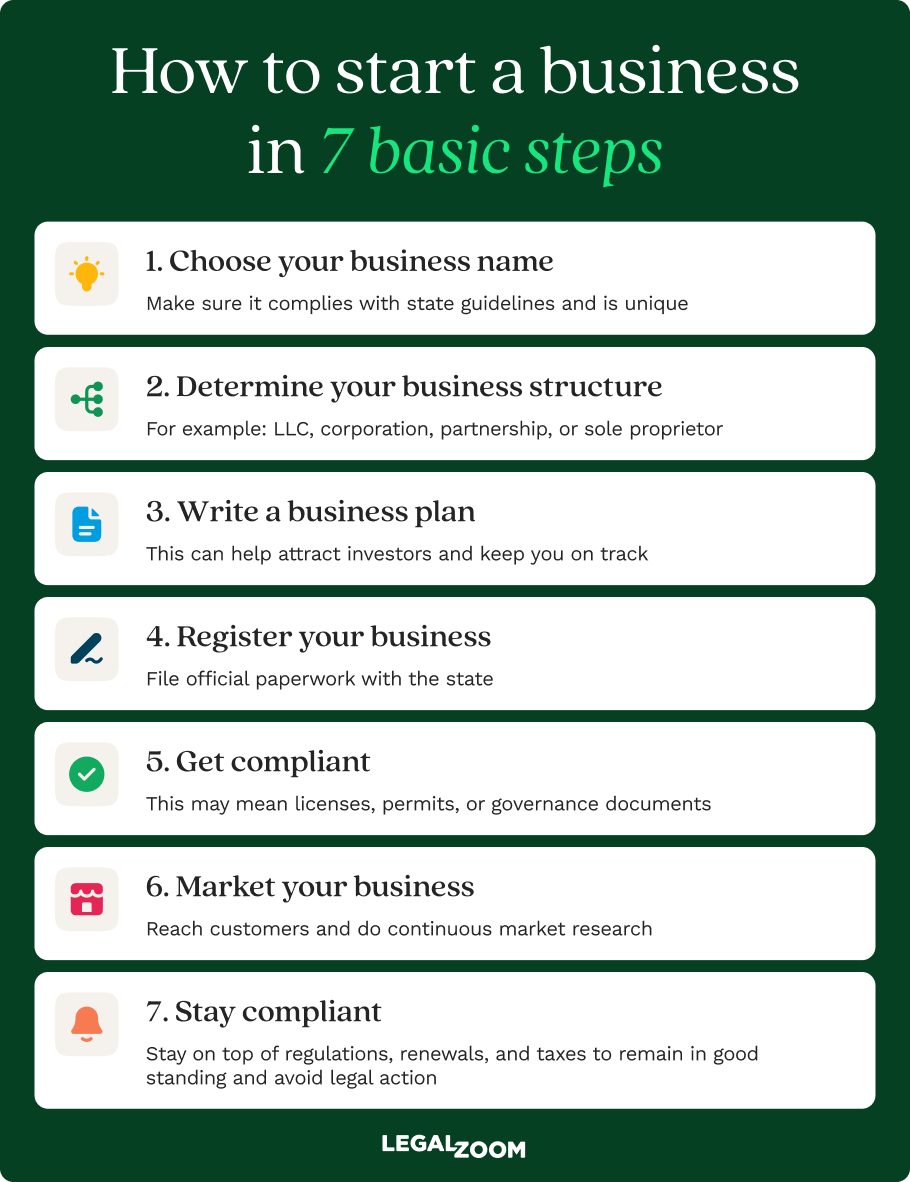Launching a new tech startup or software as a service (SaaS) company lets you follow your passions while still providing useful tools that can benefit others. But your great ideas alone won’t set your business up for long-term success and scalability. To do that, you’ll need to choose the right business structure that supports your growth.
Forming a tech startup limited liability company (LLC) can help you formalize your business and give you the foundation you need to grow rapidly.

Key points
- Forming an LLC creates a legal wall between you and your business. It helps safeguard your personal assets from lawsuits from rival companies, patent trolls, or users.
- Forming an LLC sends signals to potential investors (angels or venture capitalists) that you're not just a developer with a cool app, but a serious founder building a legitimate business. This foundation is essential for attracting the capital you'll need to scale and eventually take on the big players.
- Staying compliant with state and federal regulations will reduce your risk of fines and can help you keep your business in good standing.
- Trademark and copyright registrations can protect your ideas from being stolen or copied by competitors. Secure your brand assets early on to keep others from profiting off of your hard work.
Why an LLC is the smart choice for tech startups
Forming an LLC when you launch your tech startup or SaaS company can help you protect your business and set your company up to support sustainable growth. These are a few reasons why forming an LLC may be the right choice for your business.
- Limited liability protection. When you form a limited liability company, you reduce your personal liability by separating your business from your personal assets. If anyone sues your company, they shouldn’t be able to go after your personal assets. The same holds true if your business defaults on a loan, unless you personally guarantee the loan.
- Tax advantages. LLCs are pass-through entities, which means that the business doesn’t pay corporate taxes. Instead, the business’ profits and losses are passed through to the owners of the LLC. This helps you avoid double taxation associated with different types of corporations and could save you money in the long run.
- Operational flexibility and fewer compliance requirements. LLCs typically have better flexibility in how you run the business and fewer ongoing compliance requirements compared to corporations and other corporate structures.
- Helps attract investors. Forming a startup LLC makes your business look more professional and may inspire confidence in investors. This may help you get more interest, especially if you’re trying to attract angel investors or venture capital firms to fund your company.

How to start an LLC for your tech or SaaS business
No matter which state you register in, the steps to start an LLC for your tech or SaaS startup will typically be the same. Here’s what you can expect.
1. Choose a state to form your LLC in
Before you can start filling out paperwork, you need to choose a state to form your LLC in. It’s common to form your LLC in the state where your startup will operate most frequently. This can be your home state or, if you’re planning on relocating, the state you’re going to move to.
2. Name your LLC
Every LLC needs to have a name before you can register it with the state. Think about what you want to call your LLC. It can be the same name as your business, your personal name, or anything else you’re comfortable with. Not sure where to start? Consider using a name generator for inspiration.
Once you have a name in mind, make sure it’s not in use. Perform a name search to see if your preferred name is available. If it’s not, choose something else.
If you want to use a name other than your official registered name, you will also need to file a doing business as (DBA) registration so the state can link your preferred business name with your LLC’s registered name. For instance, Meta Platforms, Inc. is better known by its DBA name, Meta. This is different from Facebook, which is an independent corporation owned by Meta.
3. Pick a registered agent
Most LLCs, regardless of the type of startup you’re running, need a registered agent to receive legal documents and notices during normal business hours. You can act as your own registered agent, but many business owners prefer to appoint a designated agent to work for them.
The registered agent must be located in the state in which you’re forming your LLC, and should understand their obligations to your business when acting as your agent. You can choose a local registered agent in your area or use a registered agent service that pairs you with an experienced agent.
4. File your articles of organization
Your articles of organization serve as your registration with the state. When you create your articles of organization, you’ll need to include information like:
- The name of your LLC
- Your business’s main physical address and mailing address
- Your LLC’s contact information, including email and phone number
- The date you formed your LLC
- Your registered agent’s name and contact information
- Your business activity or purpose
Once you fill everything out, you’ll need to file your articles of organization with the Secretary of State. You can typically do this online through the Secretary of State’s website or by mail. You’ll also have to pay a filing fee when you send your documents. This fee varies, but typically ranges from $50 to $250, depending on your state.
5. Write your operating agreement
Your operating agreement isn’t something you need to file with the state, but it is something you should create when forming your startup LLC. It explains how you’ll run your business and explains each member’s responsibilities and obligations to the company. This makes it incredibly beneficial for startups with multiple founders or business partners.
Each agreement should be unique, but you’ll want to include information such as:
- The ownership structure and percentage of ownership for each member
- The management structure for the LLC
- How you’ll handle profit distribution
- The process for adding or removing members
This agreement helps your startup be more consistent as you grow and may help you transition from a startup mentality to a fully funded and growing corporation down the line.
6. Get an employer identification number (EIN)
When you form an LLC, you’re forming a separate entity, and that entity likely needs its own EIN, which works much like a Social Security number for your business. EINs are used when filing taxes and aren't always required, but they are necessary if you're hiring employees and may be required by banks or investors.
This number comes from the Internal Revenue Service (IRS) and helps them track your tax payments for federal tax purposes. You can request an EIN from the IRS’s website or let an LLC formation service, like LegalZoom, request one on your behalf.
7. Open a business bank account
Once you have your EIN, you’ll also want to open a dedicated business bank account and business credit card to use for all business-related transactions. This helps you keep your personal finances and your business finances separate and could make filing your taxes easier in the long run.
You can open a business bank account at your preferred bank or credit union. Just be sure that they offer commercial or business accounts.
8. Get the necessary licenses and permits
Depending on the type of tech company or startup you’re running, you may need to apply for business licenses and permits in the state where you’re doing business. The requirements vary from state to state, so be sure to read up on the requirements in your area. Failure to secure those permits could result in fines and, in some cases, may cause the state to demand that you close your doors until you get the permits in place.
Starting a business takes courage. LegalZoom makes sure the legal details don’t stand in your way, from the day you register until the day you retire.

What to do after forming your startup LLC
Once you form your LLC, there are still a few things you’ll need to do to keep your startup growing and running smoothly.
- Maintain compliance. You’ll typically need to file annual reports with your state, pay fees and taxes as needed, and keep your registered agent information up to date each year. Missing any of these requirements could lead to fines and, in some cases, may cause your LLC to lose its liability protection.
- File for a foreign LLC. If you’re doing business in a different state than the one you’re based in, you may want to file for a foreign LLC. Typically, startups will need to file as a foreign LLC if they add an office to a location in another state or hire employees based in another state.
- Protect your intellectual property. You may want to apply for a trademark for any business-related logos, slogans, and other similar items. Your trademark will keep businesses and competitors from using your assets and presenting them as their own. LegalZoom’s trademark registration service can help you get your documents in order and filed with the United States Patent and Trademark Office (USPTO). You can even use our free trademark search to make sure your assets are unique.
- Get help with taxes if needed. Business taxes can be significantly more complicated than personal taxes. Consider working with an experienced accountant when filing each year. Your accountant may help you take advantage of additional tax savings and can help you stay on top of your business taxes throughout the year.
- Prepare for restructuring. As you grow and scale your business, you may find that converting to an S corporation or a C corporation could be a better fit for your company. Moving from an LLC to a corporation could make it easier to attract VC investors or help you better position your company to go public.
How to scale your tech startup’s LLC
Forming an LLC for your startup is a great place to start, but when your business takes off, you may have to do things differently. You’ll want to start off in a position that allows your business to transform smoothly and sustainably into a larger-scale operation.
- Define your growth strategy. Create clear long-term objectives like revenue targets and operational milestones for the next year, three years, and five years. Track your performance and analyze your strengths and weaknesses as you go.
- Strategize your restructuring benchmarks. Once you understand your growth strategy, plan ahead what metrics and developmental milestones will trigger a restructuring of your business. Depending on your model, you may wish to step up to a series LLC to differentiate separate products, or go straight into a C corp model to seek series funding.
- Invest in talent. Forming an LLC sets you up to hire your first employees. Make sure each employee you bring on is capable of keeping up with your long-term vision.
- Streamline operations. Always look for ways to cut back on administrative work and other time-consuming tasks. Consider using automation to your advantage and incorporating AI agents where appropriate—a necessary way to stay competitive in today’s fast-paced market.
- Continue prioritizing your customers. The best way to champion your company’s products and to foster long-term growth is to focus on your customers. Look for ways to attract new customers by leveraging market research to identify pain points and make improvements to your products. Find ways to retain your existing customers by being receptive to their feedback. Work to make improvements to your products as needed.
Let LegalZoom help with your startup LLC formation
If you’re ready to take your tech startup live and start offering services to customers, forming an LLC sooner rather than later may be a good choice. Using an LLC formation service can make filing everything easier and faster.
LegalZoom’s services start at $0 plus state filing fees for the basic package. If you want more guidance or help with your LLC formation, the Pro and Premium packages could be good choices. The Pro and Premium packages give you access to attorney guidance and take the stress out of forming your LLC.
If you find that you need to switch to a different business structure as your company moves from startup to established brand, LegalZoom’s conversion concierge service can help you transition from an LLC to a corporation quickly.
Tech startup LLC FAQs
What’s the difference between an LLC and a C corp for a tech startup?
LLCs offer pass-through taxation and simpler compliance and are often used by small business owners or startups that aren't yet raising capital for Series A. C corporations, on the other hand, must pay corporate income tax and are better suited for attracting venture capital due to their stock structure and easier equity distribution. Many tech startups start as LLCs and convert to C corporations as they seek significant funding.
Can a single person form an LLC for their tech startup?
Yes, a single person can form a single-member LLC. This LLC provides the same limited liability protection as a multi-member LLC, identifying it as an independent legal entity and separating your personal assets from your business debts.
Do I need a lawyer to form an LLC for a startup?
No, you don’t need a lawyer to form an LLC. However, doing the paperwork yourself can increase your risk of errors that may delay the formation of your LLC. Instead, consider consulting with an attorney or using an LLC formation service like LegalZoom.
What if my tech startup operates in multiple states?
If your LLC is formed in one state but conducts significant business activities in another, you may need to register it as a foreign LLC in those other states. This ensures that you comply with local regulations and maintain your limited liability protection.
How important is the operating agreement for a single-member LLC?
Operating agreements are still important even if you’re the only member in an LLC. It formalizes your business structure and helps maintain your limited liability by showing your business’s separation from your personal assets. It can also be useful for future investors or lenders to understand your business’s governance before deciding to work with you.


